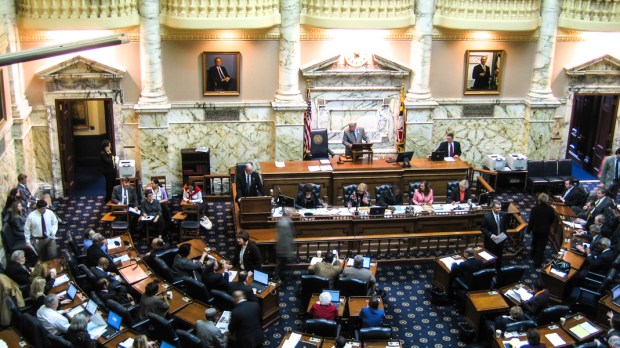If a man has been accused of rape, should he be prevented from getting legal custody of the child who results from the alleged rape?
That’s the question Maryland legislators have been grappling with for 10 years and recently failed to solve with a clear-cut law. Currently, because there are no legal restrictions, such a person could theoretically withhold his permission for the child to be put up for adoption and gain custody or at least share custody with the mother.
It’s a scenario that troubles many advocates of rape victims, but some legislators want to tread carefully into an area where those who have not been convicted of a crime are denied their rights.
In Maryland, an effort to find a solution had wide support—both bipartisan and otherwise. Both the Catholic Church and Planned Parenthood were on board. Bills had passed unanimously in both the State Senate and the House of Delegates. But a committee of legislators trying to reconcile the different bills had a meeting scheduled just an hour before the legislative session ended for the year on April 10—and could not agree on a unified bill to send Gov. Larry Hogan.
Maryland’s part-time legislature meets for only three months a year.
Democratic Member of the House of Delegates Kathleen Dumais, who sponsored the bill, said it came about because of a few “horrible” custody fights. She told the New York Times that the legislation would have affected no more than 10 cases per year.
Fox News offered the example of Shauna Prewitt. As a 21-year-old college senior in 2004, she was raped and impregnated by her attacker, the cable news outlet reported. She decided to keep her child, but her rapist sought custody of their daughter when she was born.
“In general there’s this sort of perception that [legislation] would be misused,” said Dumais, “that women would lie and say they’d been raped in order to avoid letting a father have access or custody.”
In March, the Maryland Catholic Conference offered testimony in support of Senate Bill 574 in its original form, which would have created a civil judicial procedure to extinguish paternity rights when a child was conceived of a first- or second-degree rape or incest.
“The introduced version of the bill is designed to protect women from being tormented by their rapists when they become pregnant from the rape,” the conference’s testimony said. “Currently, a rapist can assert custody and visitation rights over a child who was conceived during the rape. While the Church strongly supports keeping families together, it also recognizes that doing so may not be in the best interests of the child; particularly when the child may have contact with a parent who exhibits violent behavior. The introduced bill would also support the decision of a pregnant woman who is the victim of rape to carry her child to term without having to fear the future interference of her attacker.”
The goal was to give rape victims a way to deny custody to fathers in civil court, because the vast majority of rapes do not result in criminal convictions, the Times pointed out: “The disagreements came down to how best to protect the rights of men not convicted of crimes.”
Senator Bobby A. Zirkin, a Democrat who is chairman of the Senate’s judicial proceedings committee, noted that both bills proposed using private family courts — not criminal courts — to deny parental rights to those accused of rape. “This would be the first time I’d be aware of where we’d be proving a crime in a civil procedure,” he said. “That should be walked into carefully.” He said the Senate’s version ensured that any statements made in civil court could not be used in a criminal trial, in order to prevent self-incrimination.
State Sen. Michael Hough, a Republican on the panel that sought to reconcile the bills, told Fox that legislation calling for the termination of parental rights for “alleged rapists” presented a legal conundrum.
“If it just dealt with convicted rapists, it would be cut-and-dried,” Hough said. “Because it’s about alleged rapists, there’s a lot of legal challenges.”
Lisae C. Jordan, executive director of the Maryland Coalition Against Sexual Assault, said that the House bill had more protections than any such bill in the country. For example, it required “clear and convincing” evidence against a parent accused of rape. That, she told the Times, is a higher standard than many other civil cases.
In addition to Maryland, states that don’t have legislation preventing a rapist from gaining child custody include Alabama, Mississippi, Minnesota, North Dakota, Wyoming and New Mexico, according to the National Conference of State Legislatures (NCSL).

